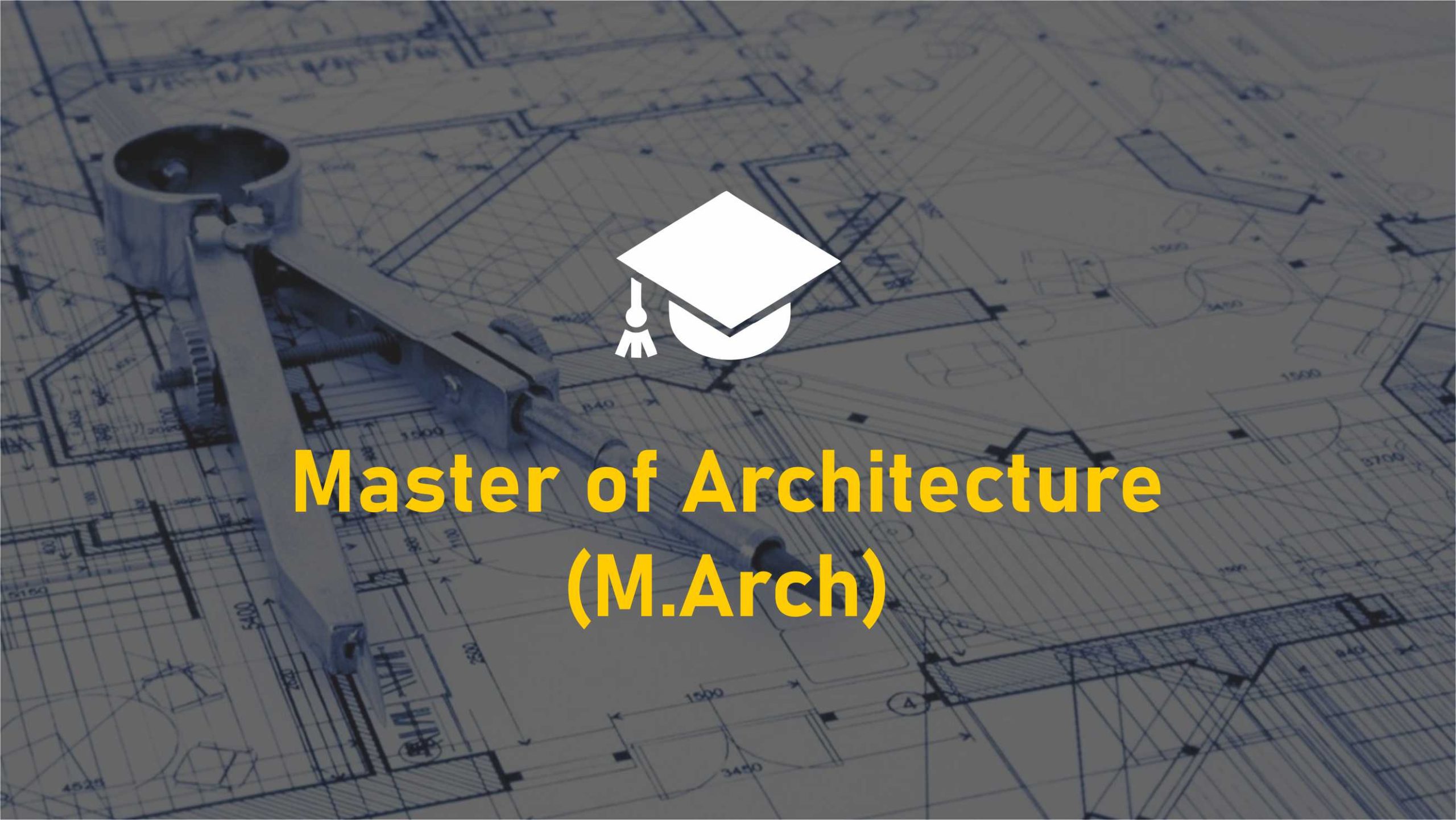M.Arch stands for Masters of Architecture. It is a postgraduate program that prepares students to work as architects. It is a two-year architectural program. In India, the Council of Architecture establishes rules and oversees professional applications in the subject of architecture. A Bachelor’s degree in Architecture with a minimum aggregate of 50% from a recognized school is required for admission to a master’s program in architecture. The student must have finished a bachelor’s degree by the deadline for submitting an application form. For admission to a Master’s Degree in Architecture, several colleges hold their own entrance exam and interview. There are other common entrance exams, such as the GATE (General Aptitude Test in Engineering) and the Common Entrance Exam for Design (CEED). Most colleges take GATE or CEED scores into account.
- M. Arch is a professional program that leads to a master’s degree. It is a high-achieving program with excellent job prospects in both the corporate and public sectors. It grants the right to practice architecture.
- This area is concerned with the process of planning, building, and constructing both commercial and residential infrastructure. It is a training that translates vision into action.
- It is a two-year curriculum separated into four semesters that can be completed on a regular or distance basis.
- This program allows students to specialize in areas of architecture such as transportation planning, industrial design, housing, commercial structures, and design, among others.
Course Highlights
| Course type | Post-Graduate |
| Eligibility | B Arch (50% marks) |
| Course Duration | 2 years |
| Admission Process | Entrance and Personal Interview |
| Examination Type | Semester |
| Course Fees | Rs 2 lakh to Rs 3 lakh |
| Top Recruiting Companies | The Department of Public Works, many architecture companies, and housing and urban development groups |
| Average salary | Rs 2 lakh to Rs 20 lakh |
| Job Position | Contractors, Project Manager, Head architect |
Master of Architecture, abbreviated M.Arch, is a postgraduate professional degree in architecture. The M.Arch degree program lasts two years and is divided into four semesters. Aspirants seeking a master’s degree in architecture learn in-depth about the advanced approach to any design, plan, or construction. While pursuing an M.Arch, candidates will encounter a variety of architectural research themes. Architecture is a field that encompasses the process of planning, developing, and implementing residential or commercial structures. The Council of Architectural (COA) is the institution responsible for regulating architecture education and practice in India. M.Arch students study not just building construction but also the design and planning of parks, gardens, and other outdoor spaces.
Specialization
This M.Arch program allows students to specialize in a variety of themes related to the research concept in the field of architecture. Candidates can pursue the M.Arch. specializations listed below.
| Architectural conservation | Building engineering and management | Housing |
| Regional planning | Industrial design | Environmental planning |
| Architecture and digital design | Urban design | Landscape architecture |
| Architectural design | Town and country planning | Regional planning |
| Sustainable architecture | Transport planning |
Eligibility Criteria
The standard qualifying criteria for admission to Masters of Architecture schedules are outlined here. This might differ from one university to the next.
- Candidates must hold a Bachelor of Architecture (B.Arch) degree with a minimum aggregate of 50%.
- It should have been completed at a recognized university.
- Students who have taken admission examinations such as the GATE and the Common Entrance Exam for Design (CEED). Some universities have entrance examinations that students must pass to be admitted. To be admitted to this course, students must have a high level of knowledge and comprehension in thinking, mathematics, design, and aptitude.
- To be qualified for the next step, candidates must score at least 50% on the admission exam.
Admission Procedure
Candidates will be admitted to the M.Arch program based on their academic achievement. Each institute or state has its M.Arch admission entrance test, for which hopefuls must apply. Candidates who meet the qualifying criteria and pay the application cost can fill out the M.Arch application form at more than one institute. The M.Arch entrance test details will be printed on the admission card. Candidates will be required to complete further admission processes as stipulated by the various institutes based on their performance in the M.Arch exam. Several prestigious institutes hold amplitude examinations in addition to interviews to give M.Arch admittance.
Entrance Exams for M.Arch (Master of Architecture)
GATE: IITs and the Indian Institute of Science jointly administer the Graduate Aptitude Test in Engineering (GATE). After passing the GATE test, candidates would be admitted to top-recognized M.Arch colleges across India.
CEED: The Common Entrance Exam for Design (CEED) is also held jointly by the IITs and the Indian Institute of Science for admission to master’s programs in design at IIT Bombay, Delhi, Guwahati, Hyderabad, Kanpur, IISc Bangalore, and IIITDM Jabalpur are among the cities represented.
OJEE: The Odisha Joint Entrance Examination Board (OJEEB) will administer the OJEE for M.Arch admission in the state of Odisha.
TANCET: The Tamil Nadu Common Entrance Test (TANCET) is administered by Anna University for admission to M.Arch programs at various colleges/institutions in Tamil Nadu.
Fees Structure
The duration of this course is two years. This course lasts the same amount of time at all institutions and universities. However, the annual rates for this course vary per institution or university. IIT incurs expenses on a yearly average of INR 50,000. The National Institute of Technology has a price tag of INR 2,000,000. Private colleges and universities charge on average between INR 15,000 and INR 1,50,000 in tuition per year.
Subjects & Syllabus
The MArch syllabus is prepared under the course curriculum established by the Council of Architecture. The two-year course’s coursework is broken into four semesters. Each semester comprises six obligatory subjects and one choice subject. Students should complete their dissertation and thesis on any specific subject during the last year of this program. The syllabus for this course is shown in the list below.
| SEMESTER I | SEMESTER 2 |
| Urban design studio | Web design |
| Sustainable and green building design | Contemporary architecture II |
| Urban conservation | Urban landscape design |
| Theories and trends in contemporary architecture | Building performance evaluation |
| ecology | Portfolio production |
| SEMESTER III | SEMESTER IV |
| Architecture and critical theory | Material conversion |
| Research methodology | Building Management |
| Landscape architecture’s sustainability and energy conservation | In urban planning, GIS modeling is used. |
| Dissertation | thesis |
| Emerging practices in housing | Building information modeling |
Each semester includes optional courses. During each semester, students can select their preferred elective course. The optional subjects are as follows:
| Resource conserving architecture | Futuristic architecture |
| Low-cost building design and techniques | Advanced landscape design |
| Building bye-laws and professional practice | Research techniques in architecture and planning |
| Housing | Project management |
| High-rise buildings |
Placement
The market circumstances in this industry are quite diverse, with several prospects. Candidates have the option of establishing their own businesses and beginning to practice. Architects may plan and design residential and commercial structures.
In a country like India, where smart city development is more prevalent. There are several career opportunities available to M.Arch graduate students, all of which pay well. The architecture profession is well-equipped with work prospects in the architecture industry. Candidates can review the job roles listed below, as well as the typical beginning pay for that position.
| Job profile | Average salary (annually) |
| Design Architect | Rs. 3 – 5 lakh |
| Project manager | Rs. 3 – 10 lakh |
| Landscape architect | Rs. 4 – 7 lakh |
| Public works department | Depending on the contract’s budget |
| Project architect | 2,50,000 – 9,50,000 |
| Head architect | Rs. 10- 12 lakh |
| Professor | 2,60,000 – 8,00,000 |
Course Scope
This course is created in such a way that students who complete it will be able to meet all of the criteria for professional practice. Students who complete this course will have a future career in architectural design and planning. They can either find a great job in the related field or establish their architectural design and planning firm.
Architects have several job options in private businesses that build infrastructure in both urban and rural locations. Organizations that want to extend their infrastructure on a considerable scale always look for expert architects who are eager to work on their projects. As a result, applicants who have finished their Master in Architecture have a wide choice of professional options.
Upon completion of this course, they will be recognized as a valid architect and will be able to embark on various commercial architectural projects. Candidates looking for information on the scope of M.Arch can find it here.
- To raise their awareness and comprehension of modern building services used in diverse complex structures. They can solve environmental concerns associated with these services.
- The Master of Architecture program is rigorous and comprehensive, preparing graduates for a wide range of professional activities in architecture.
- Candidates will have a strong foundation in history, theory, technology, the social environment, and professional practice.
- After obtaining M.Arch, aspirants will readily comprehend the integration of services in sustainable design solutions.
Architects may plan and design numerous residential and commercial structures competently. Every infrastructure developer carefully considers an architect’s design prospect while creating a building. Architects’ approval is essential for everything from designing a blueprint to estimating the cost of the infrastructure to be built. They have a lot of opportunities to advance their careers in many business fields. Some of the industries in which they can operate as professional architects are as follows:
| Organizations involved in housing and urban development | National Institute of City Planning |
| PWD stands for Public Works Department. | Organizations for architecture development |
| Department of Railways | Educational establishments |
| Firms specializing in town and rural planning | Municipal development authorities |
| Houses of publishing | National construction organization |
| Department of Telegraphs and Posts |
FAQs Related to M.Arch
Q. Is B.Arch required for M.Arch?
Ans. Yes, to pursue a Master’s degree in Architecture, the candidate must have finished a B.Arch from a recognized university with a minimum aggregate of 50%.
Q. Is there an age requirement for M.Arch?
Ans. There is no upper age limit for entry to the M.Arch program. The sole condition is that the student has finished B.Arch and has taken the admission exam through GATE or CEED.
Q. Is there a minimum score needed for M.Arch admission?
Ans. Yes, the candidate must have taken GATE or CEED and received a minimum of 50% on the exam. Students with fewer than 50% will be automatically disqualified from further consideration.
Q. Is a foreign degree recognized in India?
Ans. Yes, if the student holds an M.Arch from a foreign university, he is eligible to practice in India. He may start his own business and earn more money. They can build their team and handle all aspects of planning and conservation. The compensation will be determined by the contract chosen.
Q. What is the finest nation for M.Arch?
Ans. M.Arch programs are available in a variety of nations, including
- the USA- They mostly provide specialized in urban planning or architectural design.
- Singapore
- Australia
- Canada
- Germany
Q. Do I have to take an elective every semester?
Ans. Yes, students are required to choose an elective topic each semester.

